Kapse Paithani Park
Objectives Of The Project
What does the Paithani Complex intend to achieve?
Kapse Group aims to increase local employment, conserve the art of Paithani weaving, make Paithanis from raw material and make them the very best there can be.
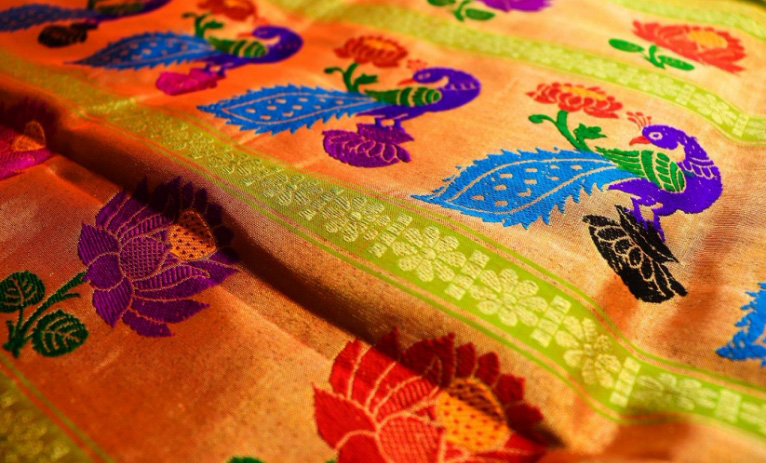
- Conservation of the art and the culture of Paithani weaving
With time, the breed of expert Paithani weavers are vanishing along with their rare talent and only a handful of them practise the art today. A plan has to be drawn and implemented without delay If the art is to survive and regain its past glory. The art of Paithani weaving in Maharashtra is not only ancient and uncommon but it reflects the essence of exceptional talent. The Paithani, woven on a handloom with a delicate gift of expertise, is faced with terrible competition from Paithani’s woven on powerlooms today. The Paithani with its gold threads has been an integral part of the bridal costume. Kapse Paithani Park aims to preserve and propagate the matchless art of making a Paithani on the handloom. The park will also have a Paithani museum.
- Integrated complex for Paithani manufacture
There is a limited network of traders and sellers of Paithani and its cloth. The raw material required for the Paithani, the process before and after the weaving, points of retail and wholesale sale are not available under one roof. We are planning to develop an integrated complex at Kapse Paithani Park where all such factors will be addressed. This will boost Paithani production and help control the price. The Park will house 2000 handlooms. It is also proposed to have a sales chamber of 90 thousand sq. ft. There will be a storage facility for Paithanis, a dyeing centre and a residential facility for the weavers working there and plans are being made to produce silk yarn there.
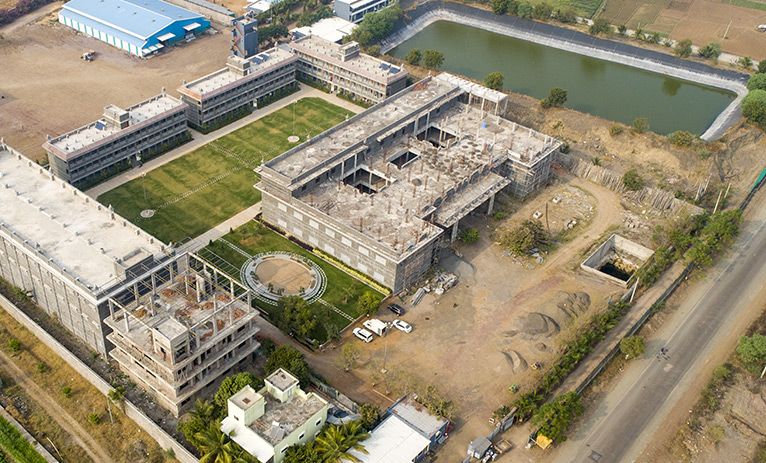
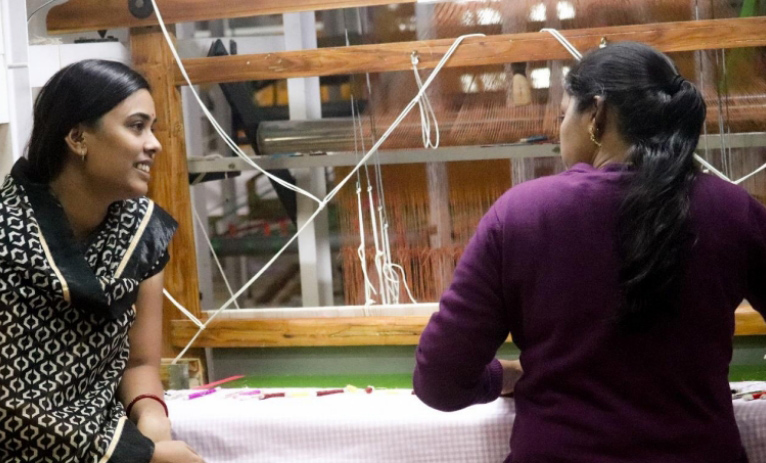
- Employment generation for the local people
Handloom industry has immense capacity of employment generation. A large section of the population of Yeola and its neighbourhood is in search of good livelihood and good living. The Paithani industry can provide jobs to 15 to 20 thousand people if they are trained in Paithani weaving and if they master it. This employment generation will automatically eliminate a number of social skills arising out of unemployment. The Paithani Park project is going to be expanded manifold to address this issue. Kapse paithani Park can employ five thousand people whereas businesses of suppliers allied to Kapse Paithani Industry can create livelihood for more.
Kapse Paithani Complex (Park)
Kapse Paithani Complex (Park)
Kapse Paithani Park, established on more than 57 acres at Vadgaon on the outskirts of Yeola, has become a prosperous centre of sale of Paithanis and other products and buyers come here to enjoy an outing. This is a commercial venture with an important social aspect. It has become an important centre to get to know the history of Paithani and also to see the exhibition of the art of paithani weaving.
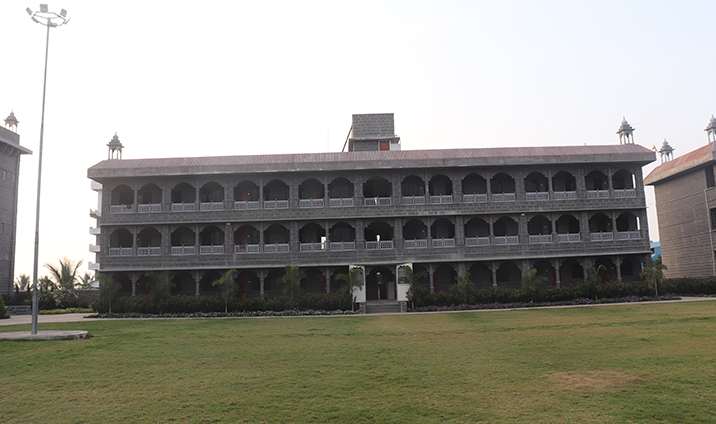
It has become an important centre to get to know the history of Paithani and also to see the exhibition of the art of paithani weaving. The centre will house an exhibition where a section will introduce the visitors to this ancient art. The project is in process and the dream of Kapse Group is nearing its realisation.
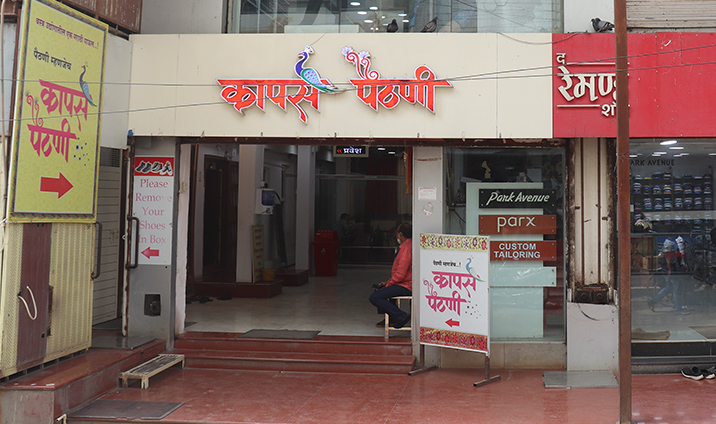
K K Handloom Group has been successful in conserving the process of weaving Paithani cloth and in taking it back to its roots. The experts working on this unusual art will certainly add to the attraction of Paithani Park and the objective to make it a model of excellence too will be achieved.
Everything from production to sale of a Paithani
The Main Project of the 'Paithani Complex'
Sales chamber and a museum

Total capacity of weavers
Weavers trained annually
Expenditure on training facilities
Expenditure on training module
Training Centre
Kapse Foundation has made a number of MoUs for the training of weaving and other skills. A group of 100 trainees will be trained in weaving skills. The objective is to train 400 trainees per year with daily duration of four hours and one batch will be trained within 6 months. There will be two batches per day and 400 students will be trained in four batches in a year.
Classrooms and 100 handlooms, along with other equipment will have to be provided for this training. The trainees will have their books and there will also be sessions of hands-on training. There will be a team of seven trainers and three assistants for every batch. Provision is being made for the capital expenditure as well as the recurrent outgoings. Capital investments will also be necessary for the classrooms and the handlooms, which will amount to approximately three and half crores. Recurrent expenses such as remuneration of trainers and other staff, raw material and supervision will need an investment of rupees one crore twenty lakhs per batch. Weavers' training will take place in the classrooms and the hands-on training on the handlooms.
Classroom training: Handloom training (100 hours) plus raw material training (50 hours)
Practical training: All information about the loom and the know-how of running it. (200 hours) And imbibing the fundamental technique of weaving (150 hours)

Production Department
The construction of the production department began in 2016 and as of date 39000 sq. ft. of land has been developed over three floors, with a provision to add four more floors in future. Each of the three floors developed so far can accommodate 80 handlooms. At present 80 handlooms are functioning on the first floor and 80 more handlooms are installed on the second floor. The looms working now are employed to produce the cloth for the Paithani. Handlooms on other floors will be used to produce cotton and Khadi cloth.
This department will also house the design section. Designs are supplied to the weaver workmen. Once the dye on the Paithani cloth dries, it is here that it is fitted onto the looms to make design patterns.

Staff Quarters
Staff quarters are being built on behalf of Kapse Foundation for the benefit of economically weak workers and weavers. So far four buildings with 71 apartments have already been constructed. Each apartment is 600 sq. ft. in area and 33 families live in such apartments at present.
Free of cost residential facilities are being provided to tribals and weavers suffering from speech and hearing impairment. An amount of Rs.1200 is recovered from other families residing in this building. 9 more buildings are planned on this plot where 36 apartments of 1200 sq. ft. will be built. The entire work is expected to be completed by 2023. These apartments will house the office staff apart from the weavers in Paithani Park.
The Foundation also plans to construct more apartments to train tribals and the hearing-impaired in weaving skills. The park has an additional plot of 15 acres for this purpose.

Facilities for visitors
Refreshment facilities will be made available for the customers and the visitors who come to the Paithani Park. These facilities will be completed by 2021 and will accommodate 100 people. There will be a visitors' chamber to enable them to relax and also a conference room.
There is a tradition of Basta - large scale purchasing of clothes - for weddings, in which a number of family members participate. Separate spacious rooms will be provided for such families who come for large scale purchases where they can make their purchases at their leisure.
Solar energy units are going to be erected on the terraces of Kapse Paithani Park, which will provide green energy. This solar energy project of 50 KW will cover the entire energy requirements of Kapse Paithani Park.

Facilities
We Are Set To Serve The Paithani At Our Kapse Complex.
Here at Kapse Paithani Complex, we are offering all facilities necessary for the manufacture of Paithanis and we are also creating modern infrastructural amenities which will enable the Complex to face future challenges and environmental issues. We sincerely want to protect the past, the present and the future of the Paithani ...
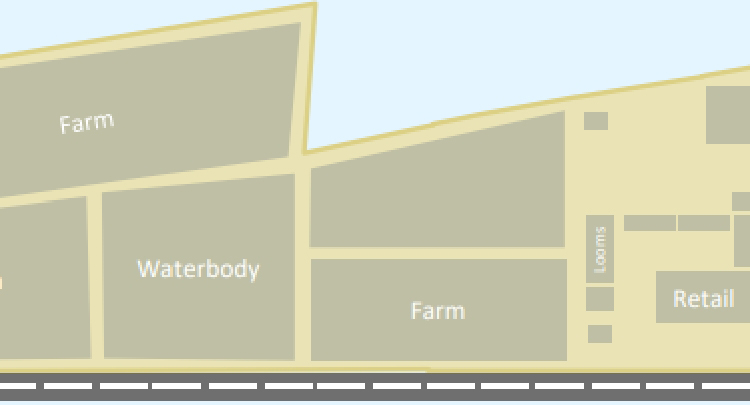
A water supply tank, a water purification plant, roads, drainage system and rainwater drains, a solar energy generation system, a cafeteria, a hall, an amphitheatre, a sports and entertainment complex, a temple are some of the amenities that are being developed. A primary school, a secondary school and a Primary Health Centre are also in the making.
- Capacity of the school for the children of staff: 1 thousand students
- Road to be built: 21 Km
- Primary health Centre capacity: 50 beds
- Primary health Centre capacity: 1200 kw
- Total expenditure: 81.5 Crores
Paithani Weaving Art
Yeola, First Home To Paithanis
Situated on the Nashik - Aurangabad National highway, at 83 Km from Nashik city, Yeola is a prominent Paithani weaving centre. Yeola's history dates back to the 19th century, when Raghoji Naik brought with him silk weavers and made yeola their home. Thereafter Yeola quickly accepted the art of Paithani making. Its production too received a boost.
10-12
Famous traders
